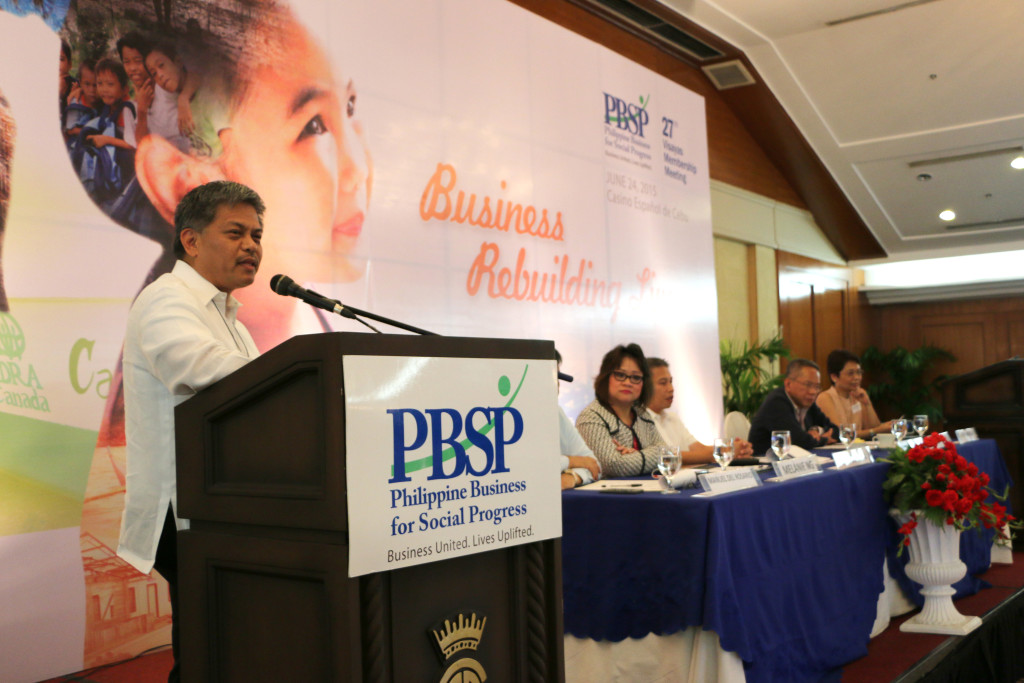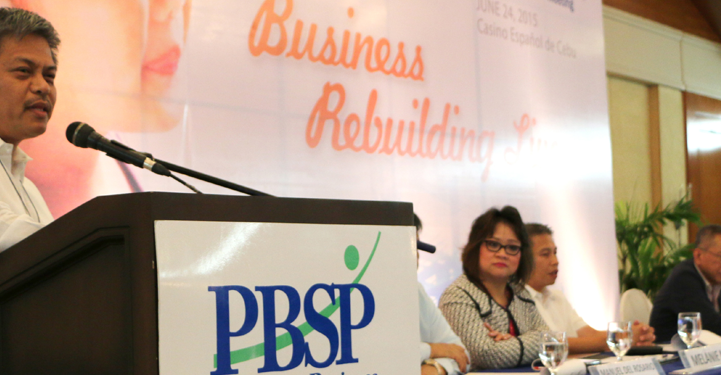Education Secretary gives ‘homework’ to businessmen

IN A RARE OCASSION, Education Secretary Bro. Armin Luistro gives an assignment to the business sector, urging them to help his department in its goal to produce qualified graduates who meet industry needs. Looking on while Luistro delivers his speech at the Philippine Business for Social Progress (PBSP) Visayas Membership Meeting in Cebu are (from left) Atty. Manuel del Rosario, (partly hidden) senior vice president for HR and Corporate Affairs of Philippine Associated Smelting and Refining Corporation (PASAR); Melanie Ng, executive vice president of Ng Khai Dev’t. Corp.; Rafael C. Lopa, PBSP executive director; Philip Tan, PBSP vice chairman for Visayas and Wellmade Motors Dev’t Corp. president and chief executive officer; and Eileen Mangubat, publisher, Cebu Daily News.
Imagine CEOs and other officials of top companies who are gathered for a business meeting being asked by no less than the Department of Education (DepEd) Secretary himself, Bro. Armin Luistro to take down notes for an assignment! This rare event happened during the recent 27th Visayas Membership Meeting of Philippine Business for Social Progress (PBSP) where the function hall of the Casino Español de Cebu in Cebu City seemed to have transformed into a classroom when Luistro who was the keynote speaker, suddenly unleashed the teacher in him.
“I will give you some homework and my first homework to you is to engage with the department. Help us craft the curriculum so that we can become more relevant to the industry’s needs,” Luistro said in his speech.
FOUR ASSIGNMENTS
As he challenged the 300 business leaders present in the event to show their sincerity in uplifting lives, he listed down things he wishes businesses would do, starting with the improvement of the Senior High School curriculum as part of the full implementation of DepEd’s K to 12 program.
“Our curriculum can have inputs from the business community on relevant subjects and skills that the industry needs. In the past decades, the critique of the curriculum is that our graduates are not ready with the new needs of business. But I am going back to you, the business sector, and asking you to not complain if you get graduates who are not tailor fit with what the industry needs today,” the former president of De La Salle University in Taft, Manila said.
He then asked for the commitment of business leaders by signing up on the enactment of a massive campaign or a census requiring all households to list down any child who is not in school.
Luistro also urged everyone to partner with the education department in referring people who did not finish high school so that DepEd can devise a program for them under the Alternative Learning System (ALS).
“One of the things that should help us with that, even in the household level, is to check if there is someone in the house who did not finish high school; it may be a family member of the neighbors. If we do that by village and by corporation, we will be able to create a program for that,” Luistro added.
He also asked companies to send their experts to teach in senior high school and accept students for training and immersions so that the youth will be more equipped once they graduate from senior high school.
“The IRR (Implementing Rules and Regulations) for teachers in the senior high school program allows part-timers and practitioners to actually teach subjects that they are practicing. Whether they are engineers, technicians, or accountants, we will accept those teachers working part-time. The next request is for you to open up your corporations and firms so that our students can be with you for immersion and on-the-job training with supervision from their respective teachers so that this close link between the education sector and the industry can be firmly established,” he pointed out.
MORE NEEDS TO BE DONE
Luistro also thanked PBSP for supporting the department in opening up access to many schools. He cited that in 2008, there were 2.9 million school-aged Filipinos or children between five to 15 years of age who are out of school but according to the recent statistics by the Philippine Institute for Development Studies (PDIS), this figure was cut in half.
He said, “PDIS’s 2013 study says that the numbers went down to around 1.2 million out-of-school youth for that same sector of our society, and garnering around just over 5.5 percent of that age sector. I am hoping that in the last school year and this current one, the number of school-aged Filipinos who are out of school will go do down to less than a million.” Luistro challenged the business community in the Visayas region to continue doing their share in giving the less fortunate the chance to go to school.
“If the Visayas (businessmen) want to pursue rebuilding lives beyond building structures, my challenge is that in three months’ time, you will be able to do this house to house and corporation by corporation census, and ensure that we are able to provide the people with all the needed access to education,” he said
In this year’s Visayas Membership Meeting, PBSP reported to member-companies the impact of its Project New Dawn on beneficiary communities who were affected by super typhoon Yolanda last November 2013.
Project New Dawn was launched in June 2014 to provide long-term rehabilitation interventions in the areas of Health, Education, the Environment and Livelihood & Enterprise Development (HEEL) in the affected communities.
Other highlights of the event were the introduction of new member-companies Lear Corporation and City Savings Bank, as well as the launch of two new projects. These are the rehabilitation project with Help from Germany and the International Labor Organization (ILO) for 800 households in northern Cebu, and a sustainable coastal livelihood and resource management project for 12 coastal barangays in Daram, Samar, in partnership with Karl Kübel Stiftung für Kind und Familie (KKS).









